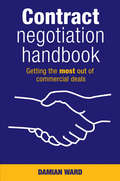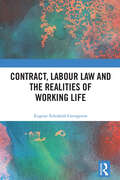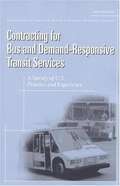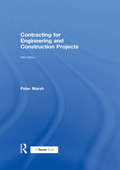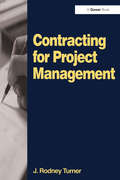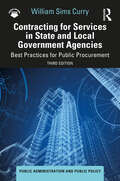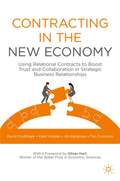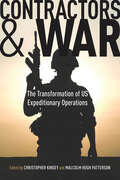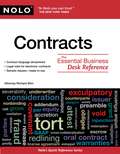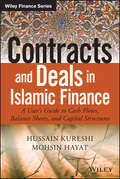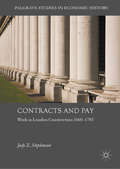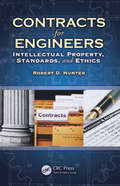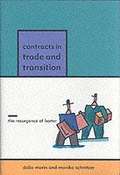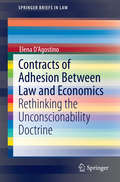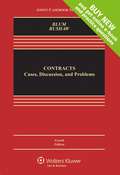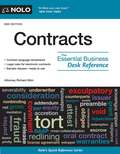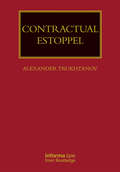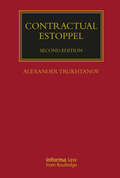- Table View
- List View
Contract negotiation handbook
by Damian WardA good commercial contract is both a springboard and a safety net -- it provides the opportunity to expand and grow your business, but also to protect it if things go wrong. In a tough commercial world, getting the best deal you can is paramount. The Contract Negotiation Handbook demystifies complex legal principles so that busy businesspeople can quickly and easily digest them. With clear, practical examples and case studies to help illustrate and explain different types of contracts and contractual situations, this comprehensive handbook will help you: prepare for negotiations and identify contractual terms make sure you have covered the 'springboard and the safety net' -- combining the appealing and less appealing aspects of contracts identify the type of negotiator that your counter party is and how that affects your negotiations develop an overview of contract law devise a negotiation strategy identify whether you are in a contractual dispute prepare for and acquire the best result out of any contractual dispute.
Contract, Labour Law and the Realities of Working Life
by Eugene Schofield-GeorgesonThis book offers a critical and timely account of how labour law has become a means for protecting employers rather than workers.The past few decades have witnessed something of a ‘silent revolution’ in the traditional protective role that labour law has played in the lives of workers. While this transformation has been overt in the realm of the market and at the level of the legislature, the role of the judiciary in this process remains significantly under-studied. Focussing on Australia, but drawing also on material from New Zealand, the UK and Canada, this book investigates how the common law has intervened to shape labour law in the image of commercial contract, determining disputes and defining legal issues by ignoring the realities of working life. Under this new conception of labour law, industrial relations between workers and employers are rarely reciprocal or relational. Rather, they are determined by the legal meaning and purpose of the contract of employment, drafted by lawyers for the benefit of employers and their human resources departments. Having demonstrated how approaches to contractual formalist legal reasoning have redefined labour law, this book goes on to propose an array of innovative legal and policy strategies to restore the protective role of labour law to the employment relationship.Scholarly, but also accessible to students, this book will appeal to those with interests in labour law, contract law and sociolegal studies.
Contracting International Employee Participation: Global Framework Agreements (International Law and Economics)
by Felix HadwigerIn the last two decades, multinational companies (MNCs) and global union federations (GUFs) have started to negotiate so-called global framework agreements (GFAs) which define minimum standards for labor conditions across their locations. This book focuses on the question why companies conclude GFAs, and identifies four groups of incentives: reduction and privatization of conflicts; public relations; promotion of equal competitive conditions; exogenous requirements and avoidance of public regulation. Based on an in-depth analysis of incentives considered to play a dominant role in the decision of companies to conclude GFAs, the book attempts to predict under which conditions GFAs can be expected to proliferate in the future.
Contracting With Organized Delivery Systems: Selecting, Evaluating, and Negotiating Contracts (APA Practitioner's Toolbox Series)
by American Psychological AssociationThis manual was written to serve both as a reference and as a tool to help providers practice more efficiently in a changing, demanding marketplace. Discusses terminology, contract evaluation, Payer and Provider Responsibilities. Good tool for therapist considering working with managed care systems.
Contracting and Control in Venture Capital
by Paul A. GompersDiscusses the control mechanisms and contracts utilized by venture capitalists. The emphasis is on understanding potential conflicts of interest and how the contracts mitigate those conflicts.
Contracting and Safety: Exploring Outsourcing Practices in High-Hazard Industries (SpringerBriefs in Applied Sciences and Technology)
by Jan Hayes Stéphanie TillementThis open access book examines the increase in outsourcing, contracting and subcontracting as ways of organising work. It explores the impact of these employment arrangements on public safety, particularly when they are linked to complex supply networks in a range of engineering industries including oil and gas, nuclear power and aviation. The brief provides practical recommendations on how best to manage arrangements that target short-term profitability and also maintain excellence in long-term safety outcomes. The brief is a source of advice for organisations on how to maximise the benefits and minimise long-term system reliability issues that can be introduced by contracting and outsourcing, rather than assuming it to be a wholly negative or positive practice. Contracting and Safety comprises qualitative, empirical studies focusing on high-reliability organisation. As such, this brief provides a rich picture of the experience of working in complex supply chains. It will be of interest to researchers in industrial safety, as well as safety professionals and project managers within engineering industries.
Contracting for Bus and Demand-Responsive Transit Services: A Survey of U.S. Practice and Experience
by National Research CouncilThe National Academies Press (NAP)--publisher for the National Academies--publishes more than 200 books a year offering the most authoritative views, definitive information, and groundbreaking recommendations on a wide range of topics in science, engineering, and health. Our books are unique in that they are authored by the nation's leading experts in every scientific field.
Contracting for Engineering and Construction Projects
by Peter MarshPeter Marsh’s book has long been recognized as a standard work. With its emphasis on the commercial aspects of contracting, this book represents an eminently practical guide to this complex subject for purchaser and contractor alike. This edition reflects recent changes in case law and legislation, the major change being the passing of the Housing Grants, Construction and Regeneration Act 1996. The book also charts changes to model forms of contract conditions, in particular the new PACE forms of government contracts. Contracts covered are those for the construction of buildings and civil engineering works, the supply and installation of mechanical, electrical and process plants and also for computer system and facilities management. Methods of contracting, including PFI schemes, are critically examined and reference is made to the Government’s latest thinking on prime contracting. As in previous editions, this book covers contract planning and contract administration, deals with both the preparation and the appraisal of tenders and explains in detail how to draft the key clauses in a contract to ensure the maximum advantage. In this revised version, Contracting for Engineering and Construction Projects will continue to serve the needs of purchasing and contracts staff, engineers, quantity surveyors, project managers and legal advisers seeking a reliable source of guidance.
Contracting for Project Management
by J. Rodney TurnerIn all but the smallest of projects the project sponsor inevitably has to buy in the goods and services of other suppliers. This requires people to make contracts so that they know the basis on which they are working with each other and to deal with any disagreements that subsequently arise. So a knowledge of contracting specifically for project management is essential if a project is to avoid difficulties and reach a successful conclusion. This book concentrates specifically on the contracting issues that surround projects of any size.
Contracting for Public Services (Masters in Public Management)
by Carsten GreveInsightful and comprehensive and covering new subjects like globalization and IT, this text, international in its approach, provides a thorough introduction to the key phases of the contracting process and the skills required by managers in its implementation. These include: policy for contracting strategic purchasing understanding markets communicating the contracting decision designing and drafting the contract the role of the consumer the regulation of service provision Illustrated throughout with practitioner case-studies from a range of OECD countries, this book presents an important new theoretical ‘contract management model’ and a ‘mature contract model', and explores the mechanisms, formal rules and informal norms that influence the way governments contract for public services. This book is essential reading for all students of public management and all public service managers.
Contracting for Services in State and Local Government Agencies: Best Practices for Public Procurement (Public Administration and Public Policy #30)
by William Sims CurryContracting for Services in State and Local Government Agencies: Best Practices for Public Procurement, Third Edition provides state-of-the-art tools for best practice in the procurement of services at state and local levels, throughout the procurement cycle. Including lively case studies and research conducted with state and local agencies across the United States, this award-winning book provides management advice and tips on compliance to reduce costs, select the best-qualified contractors, manage contractors’ performance, and prevent corruption and waste. Utilizing the results of new research across states, cities, counties, and institutes of higher learning, this third edition offers 18 all-new best-practice documents as well as updated methodologies and templates including but not limited to: a full-length and short form request for proposal (RFP), a full-length and short form pro forma contract (PFC), a letter contract, a sample estimate at completion, a contract amendment template, and a form for evaluation of proposals. Special consideration is given to obtaining services and products during states of emergency. Several additional resources for instructors and professionals are available online, including templates and PowerPoint slides. The roadmap and templates contained in this book and available online to readers will prove essential to state and local government agency contracting professionals and other officials and employees called upon to participate in the drafting of solicitations, writing sole source justifications, writing scopes of work, serving on advance contract planning and source selection teams, recommending award of contracts, or assisting in the management of those contracts.
Contracting in Japan: The Bargains People Make When Information is Costly, Commitment is Hard, Friendships are Unstable, and Suing is Not Worth It (Cambridge Studies in Economics, Choice, and Society)
by J. Mark RamseyerEconomic arrangements, Ramseyer writes, are structured and implemented with the intent and hope that they will be carried out with 'care, intelligence, discretion, and effort.' Yet entrepreneurs work with partial information about the products, and people, they are dealing with. Contracting in Japan illustrates this by examining five sets of negotiations and unusual contractual arrangements among non-specialist businessmen, and women, in Japan. In it, Ramseyer explores how sake brewers were able to obtain and market the necessary, but difficult-to-grow, sake rice that captured the local terroir; how Buddhist temples tried to compensate for rapidly falling donations by negotiating unusual funerary contracts; and how pre-war local elites used leasing instead of loans to fund local agriculture. Ramseyer examines these entrepreneurs, discovering how they structured contracts, made credible commitments, obtained valuable information, and protected themselves from adverse consequences to create, maintain, strengthen, and leverage the social networks in which they operated.
Contracting in the New Economy: Using Relational Contracts to Boost Trust and Collaboration in Strategic Business Relationships
by Kate Vitasek David Frydlinger Jim Bergman Tim CumminsToday’s business environment is constantly evolving, filled with volatility, uncertainty, complexity and ambiguity and driven by digital transformation, globalization, and the need to creating value through innovation. These shifts demand that organizations view contracting through a different lens. Since it is impossible to predict every what-if scenario in a transactional contract, organizations in strategic and complex partnerships must shift to a mindset of shared goals and objectives built upon a strong foundation of transparency and trust, working together to mitigate risk much better than merely shifting risk to the weaker party. Contracting in the New Economy helps you to not only develop this mindset – but also offers the practical tools needed to embrace the social side of contracting, enabling your organization to harness the value creating potential of formal relational contracts. Briefly sharing the theoretical foundations that prove relational contracting works, it goes well beyond theory by providing powerful examples of relational contracting principles in practice. In addition, the authors provide a practical and proven approach for helping you to put relational contracting theory into practice for your own relationships. First by providing a framework for approaching any contracting situation and helping organizations finding the best contract model for each situation. And then by sharing five proven steps you can take to create an effective relational contract for you own strategic and complex business relationships. For anyone involved in developing contracts —lawyers, in-house counsels, contract managers, C-level managers, procurement officers, and so on — this book will empower you to create powerful cooperative alliances that will help you reach —and surpass — your business goals in today’s dynamic new environment.
Contractors and War: The Transformation of US Expeditionary Operations
by Christopher Kinsey Malcolm Hugh PattersonThe U. S. military is no longer based on a Cold War self-sufficient model. Today's armed forces are a third smaller than they were during the Cold War, and yet are expected to do as much if not more than they did during those years. As a result, a transformation is occurring in the way the U. S. government expects the military to conduct operations-with much of that transformation contingent on the use of contractors to deliver support to the armed forces during military campaigns and afterwards. Contractors and Warexplains the reasons behind this transformation and evaluates how the private sector will shape and be shaped by future operations. The authors are drawn from a range of policy, legislative, military, legal, and academic backgrounds. They lay out the philosophical arguments supporting the use of contractors in combat and stabilization operations and present a spectrum of arguments that support and criticize emergent private sector roles. The book provides fresh policy guidance to those who will research, direct, and carry out future deployments.
Contracts
by Richard Stim AttorneyUnderstand virtually any contract and sign on the dotted line with confidence. Contracts are a part of everyday life now -- you can't download a piece of software or accept an employment offer without having to click "I agree" or sign at least one piece of paper. But very few of us are able to decipher the legalese in these documents, leading most people to hesitate before committing to a contract's terms. Contracts: The Essential Business Desk Reference is the first book to explain contract terms in language for the layperson. This indispensable A to Z guide covers: definitions of common terms found in contracts how to decipher the language of contracts which clauses are important and which aren't how to change contracts Contracts: The Essential Business Desk Reference will help you save money by coaching you on which clauses are important so that you can avoid a pricey professional review by a lawyer. Written in plain English, this book is especially useful for law students and business owners, but still contains enough detail to have a place on nearly any lawyer's bookshelf.
Contracts and Deals in Islamic Finance
by Mohsin Hayat Hussein KureshiA very accessible and concise guide to Islamic financeContracts and Deals in Islamic Finance provides a clear breakdown of Islamic financial contracts and deal structures for beginners. The embedded requirements within selected Islamic financial contracts, such as risk weightage, capital structures, creations of cash flows, and balance sheets, are explained fully to provide a solid understanding of the backbone of the industry. Aimed primarily at beginners and those with a background in conventional banking, this book guides readers through the major contracts, how they're applied, and how to discern a contract's legitimacy. Case studies and interviews with bankers and global regulators provide real-life examples of contract application, and the author's own experiences provide deep insight into the everyday issues that arise. Ancillary instructor's materials include PowerPoint slides and lecture notes that facilitate use in the classroom.Literature describing the application of Islamic financial contracts is few and far between, and those providing a basic breakdown of these contracts and questioning their validity are rarer still. This book is the first of its kind, offering a basic approach to understanding Islamic contracts, designed for the true beginner.Understand the current contracts applied in Islamic bankingLearn how contracts are applied across different jurisdictionsIdentify illegitimate contracts and those not in the spirit of Shariah lawExamine the current economic realities surrounding Islamic financeBy highlighting the underlying themes in Islamic finance and assessing the current practices, this book gives readers the solid understanding and up-to-date perspective that form a solid foundation upon which successful Islamic finance is practiced. For a solid introduction to the Islamic finance industry, Contracts and Deals in Islamic Finance is an accessible, practical guide.
Contracts and Pay: Work in London Construction 1660–1785 (Palgrave Studies in Economic History)
by Judy Z. StephensonThis book presents a new economic history of London construction in the early modern period. Drawing on extensive archival material from key sites such as St Paul’s Cathedral and London Bridge, it describes the organization of contracts and work on large-scale ‘extraordinary’ projects and maintenance contracts in the city during a key period of architectural and organizational development in Britain. Stephenson shows that the organisation of the industry and the welfare of its workers were shaped by the contracts and finance of large institutions and ambitious businessmen. Providing fresh wage and earnings data for craftsmen and labourers during the period, it offers new material and debate for economic, business and construction historians.
Contracts for Engineers: Intellectual Property, Standards, and Ethics
by Robert D. HunterEngineers encounter different types of contracts at nearly every turn in their careers. Contracts for Engineers: Intellectual Property, Standards, and Ethics is a tool to enhance their ability to communicate contractual issues to lawyers—and then better understand the legal advice they receive. Building on its exploration of contracts, this book expands discussion to: Patents, copyrights, trademarks, trade secrets, and other intellectual property issues Development of standards and the bodies that govern them, as well as conformity assessment and accreditation Ethics at both the micro and macro levels—a concept under major scrutiny after several major disasters, including the Gulf of Mexico oil spill, the collapse of Boston’s Big Dig, and a coal-mining accident that resulted in many deaths With a brief introduction to common law contracts and their underlying principles, including basic examples, the book presents a sample of the Uniform Commercial Code (UCC) regarding the sale of goods. It evaluates elements of the different contracts that engineers commonly encounter, such as employee and associated consulting agreements and contracts involved in construction and government. Approaching intellectual property from a contract perspective, this reference focuses on the many different types of patents and their role in commerce. It touches on the application of trademarks and recent developments in the use of copyright as a form of contract and explains the process of obtaining patents, including the rationale for investing in them. Ethical standards receive special attention, which includes a review of several prominent professional codes of ethics and conduct for both organizations and individual engineers, particularly officers and higher-level managers.
Contracts in Trade and Transition: The Resurgence of Barter
by Dalia Marin Monika SchnitzerDifficulties in contract enforcement impede international transactions in the world economy and domestic transactions in transition economies. In Contracts in Trade and Transition, Dalia Marin and Monika Schnitzer explain how barter as an economic institution can facilitate contract enforcement across national borders in international trade and within borders in transition countries. The authors show that international countertrade--tying an export to an import--emerged in the 1980s in response to the international debt crisis when Western creditors refused to finance imports to developing countries and Eastern Europe. Barter--the exchange of goods without the use of money--reemerged in transition economies in the 1990s in response to a domestic debt crisis when banks in transition countries were reluctant to provide finance to firms. Countertrade and barter introduce a deal-specific form of collateral that addresses the lack of creditworthiness of countries and firms. Drawing on contract theory, the authors argue that parties might want to pay in goods rather than cash or link an export with an import as in countertrade to solve incentive problems that otherwise would prevent any trade from taking place. The incentive problems they discuss are the technology transfer problem to developing countries and the "lack of trust" problem in the former Soviet Union.
Contracts of Adhesion Between Law and Economics: Rethinking the Unconscionability Doctrine (SpringerBriefs in Law)
by Elena D'AgostinoThis book examines the most controversial issues concerning the use of pre-drafted clauses in fine print, which are usually included in consumer contracts and presented to consumers on a take-it-or-leave-it basis. By applying a multi-disciplinary approach that combines consumer's psychology and seller's drafting power in the logic of efficiency and good faith, the book provides a fresh and unconventional analysis of the existing literature, both theoretical and empirical. Moving from the unconscionability doctrine, it criticizes (and in some cases refutes) its main conclusions based on criteria which are usually invoked to sustain the need for public intervention to protect consumers, and specifically related to Law (contract complexity), Psychology (consumer lack of sophistication criterion) and Economics (market structure criterion). It also analyzes the effects of different regulations, such as banning vexatious clauses or mandating disclosure clauses, showing that none of them protect consumers, but in fact prove to be harmful when consumers are more vulnerable, that is whenever sellers can exploit some degree of market power. In closing, the book combines these disparate aspects, arguing that the solution (if any) to the problem of consumer exploitation and market inefficiency associated with the use of contracts of adhesion in these contexts cannot be found in removing or prohibiting hidden clauses, but instead has to take into account the effects of these clauses on the contract as a whole.
Contracts: Cases, Discussion, and Problems (Aspen Casebook)
by Brian Blum Amy BushawContracts: Cases, Discussion, and Problems, Fourth Editionis known for its strikingly clear, straightforward text that illuminates cases as well as concepts and theory. The book focuses on modern cases to expose students to contemporary contract law, but it also includes many important or iconic older cases. Numerous problems, ranging from simple to complex, supplement cases and introduce topics taught most effectively through problems. The casebook s traditional organization begins with formation and then corresponds to the sequence followed by the Restatement (2nd) of Contracts and treatises. Procedural issues are highlighted when presented by the cases and transactional issues such as drafting, client counseling, and negotiation are raised through the use of questions and small exercises throughout the text. Strengthening the text s focus on contemporary methods of contracting, modern issues in standard contracts are explored along with contracts entered into electronically. International and comparative material offers alternative approaches for students to consider, such as those taken by the United Nations Convention on Contracts for the International Sale of Goods (CISG) and the UNIDROIT Principles of International Commercial Contracts.
Contracts: The Essential Business Desk Reference
by Richard StimUnderstand virtually any contract and sign on the dotted line with confidence. This is the first book to explain contract terms in language for the layperson. This indispensable A to Z guide covers: definitions of over 300 common terms found in contracts how to decipher the language of contracts which clauses are important and which aren't illegal and dangerous contract clauses to watch out for, and how to negotiate or change contracts. Contracts: The Essential Business Desk Reference will help you save money by explaining which clauses are important so that you can avoid a pricey professional review by a lawyer. Written in plain English, this book is especially useful for law students and business owners (including one-person operations and independent contractors), but still contains enough detail to have a place on nearly any lawyer's bookshelf.
Contractual Estoppel (Lloyd's Commercial Law Library)
by Alexander TrukhtanovThis book is the first comprehensive account of contractual estoppel. Contractual estoppel is a new and exciting development in the common law, widely employed and of considerable practical utility. The concept has been noticed by academics, mostly to be criticised as anomaly, misnomer and an objectionable policy choice, and commentary on the concept has been limited to recitation and critique of a few principal cases. Yet this book examines numerous judicial decisions which apply or discuss contractual estoppel, and offers a full and systematic exploration of its origin, principled basis, practical applications and limits. In this new title, the author, Alexander Trukhtanov, responds to policy objections and seeks to answer the charge that contractual estoppel is a misnomer, anomaly or distortion of reliance-based categories of estoppel, by showing that contractual estoppel is its own category of legal estoppel. The book is a single point of reference for a systematic and organised exposition of the subject and an explanation of how it fits into existing law. It is practice-oriented but engages with important conceptual points. Contractual Estoppel will be of interest to practitioners, whether draftsmen, litigators or advocates, as well as academics and post-graduate students of contract law.
Contractual Estoppel (Lloyd's Commercial Law Library)
by Alexander TrukhtanovThe second edition of this book continues to offer the first and only comprehensive account of contractual estoppel, now made fully up to date with reference to the most recent cases. Contractual estoppel, a new and exciting development in the common law, is ever more widely employed and keeps showing itself of considerable practical utility. The book examines numerous judicial decisions which apply or discuss contractual estoppel, and offers a full and systematic exploration of its origin, principled basis, practical applications and limits. The doctrine continues to develop and the second edition tracks, catalogues, discusses and explains its multifarious applications, limits and niceties. In this title, the author, Alexander Trukhtanov, maintains the principal doctrinal claim of the first edition that contractual estoppel is a not misnomer, anomaly or distortion of reliance-based categories of estoppel, but its own category of legal estoppel. The book is a single point of reference for a systematic and organised exposition of the subject and an explanation of how it fits into existing law. It is practice-oriented but engages with important conceptual points. Contractual Estoppel will be of interest to practitioners, whether draftsmen, litigators or advocates, as well as academics and post-graduate students of contract law.
Contractual Innovation in the UK Energy Markets: Enron Europe, The Eastern Group, and the Sutton Bridge Project
by Peter Tufano Benjamin C. EstyIn December 1996, Enron Europe and The Eastern Group were on the verge of signing an innovative transaction in the utility industry. Eastern was going to buy a long-term option to convert natural gas into electricity from Enron, thereby giving it the economic right to operate a "virtual" power station. This structure was vastly different from the traditional independent power plant (IPP) structure, and the executives involved had to convince their superiors of its wisdom before they could proceed. This case was jointly written for Large-Scale Investment and Corporate Financial Engineering, and it covers topics related to both project finance and financial engineering. It illustrates a new paradigm in the electric power industry: the creation of virtual power stations backed by physical power stations with merchant exposure. It also illustrates how physical operations (constructing and operating a power plant) can be used to offset contractual obligations and trading exposures.
